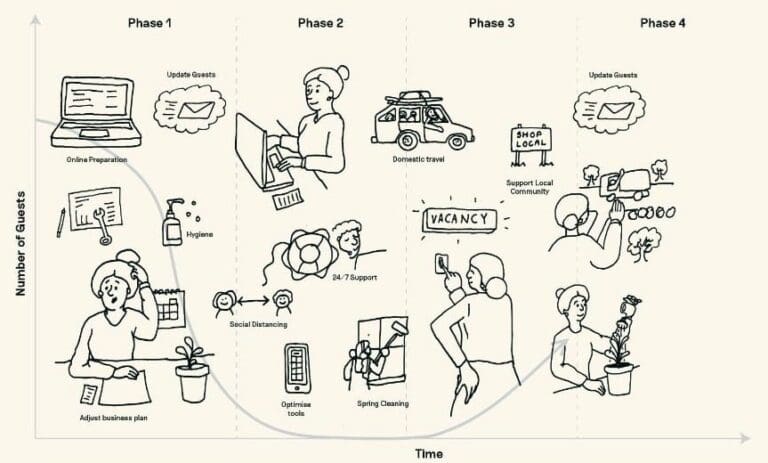There’s no denying that the coronavirus pandemic has wreaked a swift and devastating blow on our tourism industry. These are uncharted waters for us all, and uncertainty brings with it feelings of overwhelm and fear. We know that many of you are feeling concerned – but you’re also feeling determined to stay focused on the continued survival and success of the business you’ve worked so hard for.
So, here are some practical tips you can work through to help you prepare for, and better manage your way through, this unprecedented industry downturn. This checklist is to help guide hoteliers and accommodation businesses, manage operations through times of low occupancy, and adjust to a ‘new normal’.
1. Maintain good communication
Your staff, suppliers, and partners are all feeling as uncertain about the future as you are. Good communication brings comfort. Even if the news isn’t always positive, being proactive and clear in your communication about the situation and developments as they happen is fair. If you haven’t already, establish an easy means of group communication for staff so that you can easily provide collective updates.
2. Clear and relevant customer communication
Communicating with your customers should change immediately to be more understanding, clear and factual. No one would like to be bombarded with irrelevant information during a difficult time. Be relevant about what you share and when you share it. Let your customers know that you are there for them. You may not be able to change things, but can have compassion and adapt to the circumstances. Using Preno allows an accommodation provider to send automated emails to streamline communication.
3. Review your redundancy plan
Unfortunately, the reality is that you may need to make necessary changes to your staffing requirements in order to keep your doors open. Work through a hierarchy of responsibilities and requirements, and understand your financial obligations should you need to let your employees go. The redundancy process is one that needs to be closely followed to comply with policy in your country, so seek legal or external HR support if needed. Belonging to an industry association can be worth it as they offer their members valuable guidelines on how to best deal with redundancy.
4. Consider new staffing models
Explore the option of different staffing models that may allow you to maintain staff, just with reduced or changed hours, and therefore reduced payroll costs. This will allow you to retain good staff, and scale up again once restrictions are lifted and things start to pick up once more.
5. Ensure all staff have access to information
While each country will be different, it’s likely your government has issued specific guidelines regarding operations and processes to help stop the spread of Covid-19. This includes cleaning guidelines, as well as precautions that must be followed in order to protect themselves while at work. Create really clear standard operating procedures that must be followed. Insist that any staff who are feeling unwell do not come into work.
6. Review supplier agreements
Take immediate stock of variable costs and cut where you can. Many suppliers are also facing challenges of their own, and will be somewhat understanding and flexible if you approach them professionally and with transparency. Request credit terms, delayed payments or payment plans where you can. Cancel all non-essential accounts to limit outgoings to only critical fixed costs. Do remember though that paying invoices where you can keep the economy turning and will help you maintain good supplier arrangements long term.
7. Talk to your accountant
Get a clear understanding of what stimulus support is available to your business. Government support is being updated as things develop. Other agencies such as tax and business liabilities are offering some leniency to businesses that require it. If you haven’t already, discuss options with your landlord around reduced or deferred rent payments.
8. Do a bit of a spring clean
Using the down period to do those things you don’t always have time for. With the outbreak of the COVID-19 pandemic, the health and well-being of guests are of the utmost importance for hoteliers and accommodation providers. Draft a plan of action for a deep-clean around the hotel, fitness centre, meeting rooms, restaurants, guest rooms and other public areas. Guests will be on high alert when it comes to meeting their cleanliness standards once they are allowed to travel again.
9. Create your come-back plan
We know that life as-we-knew-it before will not completely return once restrictions have been lifted. Plan strategies now for re-opening with realistic budgets and targets. It’s likely that there will continue to be social distancing regulations in place for some time. For you, this may mean limited occupancy and a change in how some of your services may be able to operate.
Use this time as an opportunity to also review business processes and operations to make sure your hotel or accommodation operates as lean as possible going forward. Many technology companies are offering concessions on their platforms so that accommodation businesses may continue to make use of data and efficiencies.
Focus on what you can do once restrictions are lifted. For example, can you adapt to offer contactless pick-up or delivery options for food? What kind of customer will be your most likely opportunity once restrictions are lifted? Establish a marketing plan that puts you in a good position to take action once you have more certainty about what’s ahead. Look at this in terms of customer segment – consider who will be travelling once restrictions are lifted, and how you may be able to best reach your target customer through strategic marketing and communications.
10. Stay close to your community
Above all, while we know that it can be difficult to see an opportunity within the industry right now, the worst thing you can do is get complacent. Continue to take proactive action on things that will have your business best prepared for when you’re able to open your doors to guests again. Collaborate with your industry colleagues, community and support each other.
Join community groups online or industry webinars to stay connected, this can be a valuable source of information, to find new ways and opportunities to navigate through the tough times. Care and compassion for our communities will be reciprocated and will see support – and occupancy – return in the months to come.

















